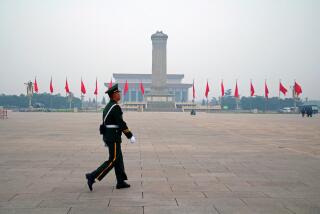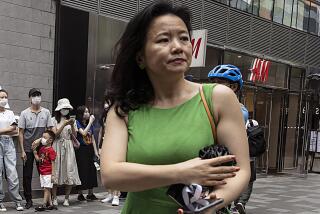China Tells Japan Reporter to Leave as Tension Mounts
- Share via
BEIJING — China’s Ministry of State Security on Friday ordered a Japanese reporter to leave the country, making him the third foreign correspondent in less than 10 months who has been required to leave China.
Shuitsu Henmi, a correspondent for Japan’s Kyodo News Service, said he was picked up at his apartment Friday, escorted to a police office and told to be out of the country within 10 days.
Henmi said he was accused of obtaining national intelligence information through illegal means, charges that he denied. Chinese authorities made no immediate comment on the case.
The action against the reporter comes at a time of mounting tension between China and Japan. On Wednesday, a Chinese Foreign Ministry spokesman said that “there exist in Japan . . . certain forces which tried in the past and are trying now to revive militarism.”
Revived Grievances
This spring, China has revived longstanding grievances about continuing trade imbalances between it and Japan. In addition, China has voiced new and increasingly bitter complaints about a recent Japanese court decision awarding ownership of a student dormitory to the government of Taiwan.
The $2.5-million dormitory, located in Kyoto, was purchased by Taiwan authorities in 1952. China maintained that after Japan broke diplomatic relations with Taiwan and recognized the Communist government in Beijing in 1972, ownership of the dormitory passed to China. But the court ruled that the dormitory is not diplomatic property and should remain in Taiwan’s hands.
Many analysts here believe that the friction with Japan is at least to some extent a reflection of China’s internal politics.
Hu Yaobang, the former Communist Party general secretary who was forced to resign last January, was regarded as especially sympathetic to Japan. Indeed, one of the charges reportedly made against Hu in the wake of his ouster was that he improperly invited 3,000 Japanese youths to a major Chinese national day pageant in 1984.
Over the past three years, Hu and the Japanese have been so closely linked with one another in Chinese domestic politics that each serves as a symbol of the other. Student demonstrations against Japan in 1985 were widely perceived as covert protests against Hu. Conversely, the ouster of Hu in January was interpreted partly as a rejection of high-consumption policies favoring Japan.
Henmi said he believes that the order for him to leave “is a reflection of relations between my country and China, which are getting worse, especially since the (dormitory) case.”
Kyodo, the agency for which Henmi works, is Japan’s largest news service and the largest foreign news agency in China. It has four correspondents in Beijing and one in Shanghai.
Last summer, Henmi was one of two foreign correspondents to break the news that an official in China’s Ministry of State Security had defected to the West. The other correspondent to break that story, Lawrence MacDonald of Agence France-Presse, was expelled last January, allegedly for receiving “intelligence” information from a student. MacDonald denied the charge.
The Japanese reporter also published a series of stories this year on Communist Party documents circulated in the wake of Hu’s ouster. Henmi said that since March, officials of the Chinese Foreign Ministry have repeatedly pressed him to reveal the names of the source or sources who leaked party documents to him.
“Kyodo’s Beijing bureau wants to keep friendly relations with the Chinese authorities,” he said in an interview. “But as a press organization, we cannot compromise on this (revealing the names of news sources).”
Could Be Prosecuted
In the meeting Friday, Henmi said, the State Security Ministry told him that he could be prosecuted under Chinese law but that “considering the friendly relations between China and Japan,” he was being asked instead to leave China within 10 days.
Henmi, 42, speaks fluent Chinese and had been here since 1984. He had also worked as a reporter in China from 1977 to 1980. He said Kyodo’s head office in Japan told him Friday to comply with the Chinese order and leave the country as quickly as possible.
The other two foreign correspondents required to leave over the past 10 months were MacDonald and John F. Burns, a New York Times correspondent detained last July after he was found to be traveling without a permit in a restricted area in central China.
More to Read
Sign up for Essential California
The most important California stories and recommendations in your inbox every morning.
You may occasionally receive promotional content from the Los Angeles Times.













